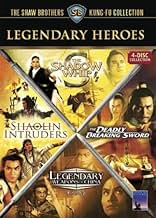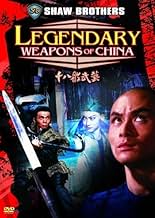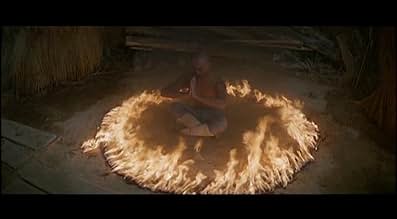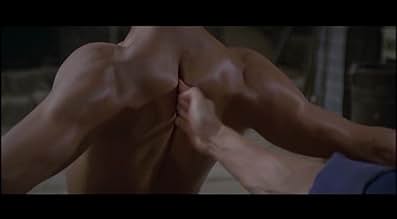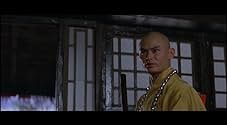NOTE IMDb
6,8/10
2 k
MA NOTE
Ajouter une intrigue dans votre langueA band of killers from an ailing kung fu and magic society are sent on a manhunt for a former member of the society, whose bad mouthing threatens its existence.A band of killers from an ailing kung fu and magic society are sent on a manhunt for a former member of the society, whose bad mouthing threatens its existence.A band of killers from an ailing kung fu and magic society are sent on a manhunt for a former member of the society, whose bad mouthing threatens its existence.
- Réalisation
- Scénario
- Casting principal
- Récompenses
- 1 nomination au total
Liu Chia-Yung
- Lei Ying
- (as Chia-Yung Liu)
Kara Ying Hung Wai
- Fang Shao-Ching
- (as Kara Hui)
Avis à la une
I think watching Shaw Brothers movies is a bit like doing martial arts; if you go a while without practice, you lose the progress and skills you built up. I went on a binge of the studio's movies early last year, then went away for a bit, and now I'm back, feeling out of shape and out of breath trying to keep up with Legendary Weapons of China.
It could be partly or wholly on me, but I'm also open to the idea that this one might just be a bit much. It throws many characters and concepts (voodoo, invulnerable warriors, mistaken identities, disguises, magic, etc) at you so quickly; I was confused from the start and just got more confused as I went on.
Now, a confusing plot hasn't got in the way of me really enjoying martial arts movies before, but I was also confused during various fight scenes in Legendary Weapons of China. It's hard to get a handle on how some of the fantasy elements work, and who has the power to do what, and with the usual fast pacing and feeling that everything is slightly sped up (not just in the fight scenes either, unusually; I think that added to the confusion for me), I couldn't keep up.
Now, if that's on me (and I'm sure at least some of it is), I can't call this terrible. There is at least the ability to admire its ambition and unique qualities, even if those things did make me lose track of the things I'd usually enjoy. And the final fight scene did redeem things in my eyes a little. It downplays the crazy magic stuff to mostly just be a one-on-one fight that goes on for a while and involves many different weapons, and it was easily the most impressive sequence from a stunt/choreography perspective.
This is the kind of film where anyone who can keep up is likely to have a blast, but for whatever reason, tonight, it was just a little too much too fast for me personally. Gotta get back to my Shaw Brothers training regime, maybe...
It could be partly or wholly on me, but I'm also open to the idea that this one might just be a bit much. It throws many characters and concepts (voodoo, invulnerable warriors, mistaken identities, disguises, magic, etc) at you so quickly; I was confused from the start and just got more confused as I went on.
Now, a confusing plot hasn't got in the way of me really enjoying martial arts movies before, but I was also confused during various fight scenes in Legendary Weapons of China. It's hard to get a handle on how some of the fantasy elements work, and who has the power to do what, and with the usual fast pacing and feeling that everything is slightly sped up (not just in the fight scenes either, unusually; I think that added to the confusion for me), I couldn't keep up.
Now, if that's on me (and I'm sure at least some of it is), I can't call this terrible. There is at least the ability to admire its ambition and unique qualities, even if those things did make me lose track of the things I'd usually enjoy. And the final fight scene did redeem things in my eyes a little. It downplays the crazy magic stuff to mostly just be a one-on-one fight that goes on for a while and involves many different weapons, and it was easily the most impressive sequence from a stunt/choreography perspective.
This is the kind of film where anyone who can keep up is likely to have a blast, but for whatever reason, tonight, it was just a little too much too fast for me personally. Gotta get back to my Shaw Brothers training regime, maybe...
10winner55
This is a brilliantly constructed film. I suppose those who remark it having a 'poor plot' long for something more simple, more direct, more traditionally 'Shaw Bros.' To be sure, the plot is intended to provide support for the interlaced themes, but it is complex and meaty on its own terms.
However the themes are indeed the heart of the film. The comic scene of the fake kung fu battle is clearly intended as a parody of the traditional swordplay film, down to the hand-squeezed blood-squib. The use of magic kung fu is, less clearly because more subtly, intended to debunk the myth of such magic, reducing it to a kind of martial-arts parlor trick - magnificently staged, but of course ineffective against anything other than itself. The real martial arts are at last presented with considerable credibility in the final third of the film, but is intended to remind us that, as powerful as it could be, the martial arts cannot compete with modern weaponry. Along the way, we also deal with problems of family loyalty, national loyalty (vs. phony 'patriotism'), and the nature of the spirituality necessary to master the martial arts, which requires an open mind and compassion rather than blind dedication.
What director Liu is reaching for is nothing less than a complete debunking of all the nonsense that had wrapped itself around the study of the martial arts in the 19th century and which was resurrected in the wake of the kung fu film phenomenon of the 1970s. Liu is asking us to respect, even admire, the martial arts, perhaps to learn them - but on their own terms, without all the myths that obscure their real essence.
This makes for a highly sophisticated script, which Liu carefully keeps popularized not only through the use of humor but, more importantly, by tight compression of story and editing. Blink and you will surely miss an important event.
As for the staging and camera-work some have remarked - technically, this film is pure classic Shaw Bros.
And as for the martial arts in the final battle - absolutely magnificent.
Unique in its genre and a real treat.
However the themes are indeed the heart of the film. The comic scene of the fake kung fu battle is clearly intended as a parody of the traditional swordplay film, down to the hand-squeezed blood-squib. The use of magic kung fu is, less clearly because more subtly, intended to debunk the myth of such magic, reducing it to a kind of martial-arts parlor trick - magnificently staged, but of course ineffective against anything other than itself. The real martial arts are at last presented with considerable credibility in the final third of the film, but is intended to remind us that, as powerful as it could be, the martial arts cannot compete with modern weaponry. Along the way, we also deal with problems of family loyalty, national loyalty (vs. phony 'patriotism'), and the nature of the spirituality necessary to master the martial arts, which requires an open mind and compassion rather than blind dedication.
What director Liu is reaching for is nothing less than a complete debunking of all the nonsense that had wrapped itself around the study of the martial arts in the 19th century and which was resurrected in the wake of the kung fu film phenomenon of the 1970s. Liu is asking us to respect, even admire, the martial arts, perhaps to learn them - but on their own terms, without all the myths that obscure their real essence.
This makes for a highly sophisticated script, which Liu carefully keeps popularized not only through the use of humor but, more importantly, by tight compression of story and editing. Blink and you will surely miss an important event.
As for the staging and camera-work some have remarked - technically, this film is pure classic Shaw Bros.
And as for the martial arts in the final battle - absolutely magnificent.
Unique in its genre and a real treat.
This movie has one of the best introductions of any film I have ever seen. The introduction shows a woman demonstrating several weapons of Kung Fu while sinister music plays. By demonstrating, I mean killing several men with these deadly weapons of Kung Fu! This movie has great style and creativity throughout. The story line is actually good, but might take several viewings to really understand what is going on.
Like others have said, it is not really a serious martial arts film, but it is one of my favorites nonetheless. You cannot beat the sinister music/introduction sequence in the beginning of the movie. That is worth watching alone. If you are a fan of Chinese Super Ninja, you will also like this movie.
Like others have said, it is not really a serious martial arts film, but it is one of my favorites nonetheless. You cannot beat the sinister music/introduction sequence in the beginning of the movie. That is worth watching alone. If you are a fan of Chinese Super Ninja, you will also like this movie.
This is a great kung fu movie once you get the opening done with. The storyline is fairly confusing in the beginning, but that passes with time. The fight scenes are neat to watch, but they get exponentially better as time goes on. The fight with Gordon Liu (36th Chamber) is good and the final fight WAS FANTASTIC! This isn't a movie to sit down and watch for the stimulation. The character development isn't as good as FIVE VENOMS, or SWORDSMAN II, but it's fair. The weapons fighting is just unbelievable in the last fight scene. All in all, if you are a fan of kung-fu movies, get around to checking this one out. The three-section-staff work is even better than in 36th Chamber.
The last reviewer of this film missed the point. This film is excellent and the last 30 minutes contains some of the best martial arts action committed to film. Yes, the plot is ridiculous and the dubbing makes everyone sound like a porn star but you don't watch kung fu films for the acting skill and production values. You watch them for escapism and entertainment.
The story itself is about the rise of the gun in china and the director, who also stars, attempting to show how pointless it was to fight the evil of the gun.
Lei Kung is a martial arts master whose speciality is 'pugilism'(i suppose it was easier to dub that word than what the real skill is called), which is basically invulnerability to conventional weapons (swords, knives, blades etc). He decided to dissolve his sect within the school he taught in to protect his students. He was forced to do this as his superiors were ordering other sect to practice 'pugilism' with the proviso of ultimately being able to withstand bullets.
So now it is several years later, Lei Kung is hiding out as a woodcutter, and the bad guys send some martial arts experts to seek him out and kill him. At first we know of three: Ti Hau, the best student of a master who teaches partial invulnerability and techniques to confuse the enemy. Chao Ching, who is a woman, but who dresses as a man to mingle with the populace. She can see how attempting to overcome the gun with 'pugilism' is pointless and wants to join Lei Kung. Finally there is Ti Tan, another master 'pugilist'.
While they are searching another man whose name is not revealed is searching for Lei Kung. His skill seems to be based on hypnotism, and dolls. He hypnotises a person, then uses a doll to control their movements, thus having someone fight for him.
Ti Hau ends up getting ill whilst searching, but is saved be Lei Kung who nurses him back to help with Chau Ching's help. She convinces Lei Kung that she wants to help, but doubts if they can convince Ti Hau when he gets better. It does not matter ultimately, because the other mysterious fighter tracks Lei Kung down. They fight, but Lei kung is well out of practice and is defeated easily. But the mysterious bad guy is Lei Kung's brother, Lei Yung who explains that he was also given the order to kill but can't kill his own brother. He suggests that Lei Kung begins to proactive again to recover his strength and power. That way he can defend himself against other killers who are after him.
Hi trains hard, and starts to get his power back. But Ti Tan turns up and starts to kick off. Ti Hau tries to explain that Lei Kung is a woodcutter who only knows basic kung fu taught to him by Chau Ching. Ti Tan is not convinced and begins his attack. Chau ching defends but is no match, neither is Ti Hau. So it is time for Lei Kung o flex hi muscles. He fights and in doing so speeds up his strength recovery. He defeats Ti Tan, but in doing so let's it slip that he really is Lei kung. Ti Hau runs off, not knowing what to do, he has witnessed Lei Kungs far superior martial skill and is unsure of how to proceed. Ti Hau returns that night, using his skills he tries to convince Lei Kung and Chau Ching that he has gathered many men, but they are dummies and Lei Kung sees through the deception. But it is not Ti Hau but his master who is attacking. Another great fight scene follows with Ti Hau turning up half way through and his own teacher turning on him when he realises he cannot kill Lei Kung. In trying to kill his student, he shows Ti Hau that there is more to life than killing and his own life is worth something. This is the reason Lei Kung disbanded his school, to protect his students who he knew would die if they tried to withstand the gun. Lei Kung defeats Ti Haus' master who then tries to kill himself. Ti Hau stops him, and his teacher also sees that perhaps his way of life is wrong, and his pupil's lives are not expendable. He leaves suggesting Ti Hau remain to carry on training and learning with Lei Kung and Chau Ching. Lei Kung walks off and dusts off his 'holy robes' explaining that he has to go to the city temple to see his brother. He explains that his brother is not really going to let him walk away, but wanted him to train up and face him in a duel to the death. He takes his 2 new students with him, and then fights his brother using weapons combat in some of the most amazing choreography i have seen in a kung fu film. He defeats his brother who he then tells to go back and report that he killed him. His brother is left broken, finally realising that personal glory is no substitute for having a rich and meaningful life.
The story itself is about the rise of the gun in china and the director, who also stars, attempting to show how pointless it was to fight the evil of the gun.
Lei Kung is a martial arts master whose speciality is 'pugilism'(i suppose it was easier to dub that word than what the real skill is called), which is basically invulnerability to conventional weapons (swords, knives, blades etc). He decided to dissolve his sect within the school he taught in to protect his students. He was forced to do this as his superiors were ordering other sect to practice 'pugilism' with the proviso of ultimately being able to withstand bullets.
So now it is several years later, Lei Kung is hiding out as a woodcutter, and the bad guys send some martial arts experts to seek him out and kill him. At first we know of three: Ti Hau, the best student of a master who teaches partial invulnerability and techniques to confuse the enemy. Chao Ching, who is a woman, but who dresses as a man to mingle with the populace. She can see how attempting to overcome the gun with 'pugilism' is pointless and wants to join Lei Kung. Finally there is Ti Tan, another master 'pugilist'.
While they are searching another man whose name is not revealed is searching for Lei Kung. His skill seems to be based on hypnotism, and dolls. He hypnotises a person, then uses a doll to control their movements, thus having someone fight for him.
Ti Hau ends up getting ill whilst searching, but is saved be Lei Kung who nurses him back to help with Chau Ching's help. She convinces Lei Kung that she wants to help, but doubts if they can convince Ti Hau when he gets better. It does not matter ultimately, because the other mysterious fighter tracks Lei Kung down. They fight, but Lei kung is well out of practice and is defeated easily. But the mysterious bad guy is Lei Kung's brother, Lei Yung who explains that he was also given the order to kill but can't kill his own brother. He suggests that Lei Kung begins to proactive again to recover his strength and power. That way he can defend himself against other killers who are after him.
Hi trains hard, and starts to get his power back. But Ti Tan turns up and starts to kick off. Ti Hau tries to explain that Lei Kung is a woodcutter who only knows basic kung fu taught to him by Chau Ching. Ti Tan is not convinced and begins his attack. Chau ching defends but is no match, neither is Ti Hau. So it is time for Lei Kung o flex hi muscles. He fights and in doing so speeds up his strength recovery. He defeats Ti Tan, but in doing so let's it slip that he really is Lei kung. Ti Hau runs off, not knowing what to do, he has witnessed Lei Kungs far superior martial skill and is unsure of how to proceed. Ti Hau returns that night, using his skills he tries to convince Lei Kung and Chau Ching that he has gathered many men, but they are dummies and Lei Kung sees through the deception. But it is not Ti Hau but his master who is attacking. Another great fight scene follows with Ti Hau turning up half way through and his own teacher turning on him when he realises he cannot kill Lei Kung. In trying to kill his student, he shows Ti Hau that there is more to life than killing and his own life is worth something. This is the reason Lei Kung disbanded his school, to protect his students who he knew would die if they tried to withstand the gun. Lei Kung defeats Ti Haus' master who then tries to kill himself. Ti Hau stops him, and his teacher also sees that perhaps his way of life is wrong, and his pupil's lives are not expendable. He leaves suggesting Ti Hau remain to carry on training and learning with Lei Kung and Chau Ching. Lei Kung walks off and dusts off his 'holy robes' explaining that he has to go to the city temple to see his brother. He explains that his brother is not really going to let him walk away, but wanted him to train up and face him in a duel to the death. He takes his 2 new students with him, and then fights his brother using weapons combat in some of the most amazing choreography i have seen in a kung fu film. He defeats his brother who he then tells to go back and report that he killed him. His brother is left broken, finally realising that personal glory is no substitute for having a rich and meaningful life.
Le saviez-vous
- AnecdotesChia-Liang Liu: [martial arts demonstration] Opening credits show a demonstration of martial arts against an empty backdrop.
- Versions alternativesThe 1987 UK video suffered extensive cuts of over 5 minutes and lost all footage of Japanese throwing stars and nunchaku used in the fight scenes.
- ConnexionsFeatured in Les hommes de main (2001)
Meilleurs choix
Connectez-vous pour évaluer et suivre la liste de favoris afin de recevoir des recommandations personnalisées
- How long is Legendary Weapons of China?Alimenté par Alexa
Détails
- Date de sortie
- Pays d’origine
- Langues
- Aussi connu sous le nom de
- Legendary Weapons of China
- Société de production
- Voir plus de crédits d'entreprise sur IMDbPro
- Durée1 heure 49 minutes
- Mixage
- Rapport de forme
- 2.35 : 1
Contribuer à cette page
Suggérer une modification ou ajouter du contenu manquant

Lacune principale
By what name was Les 18 armes légendaires du Kung Fu (1982) officially released in India in English?
Répondre


